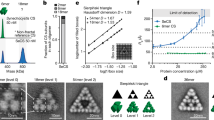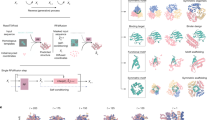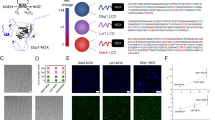Abstract
Oxygen uptake by the blood in the lungs of a resting human brings the level of saturation of haemoglobin from ∼70% to >97% (refs 1,2). The recourse to this upper portion of the oxygen binding curve is reflected in an asymmetry of the isotherm which is frequently reported3,4, but which has not been accorded any physiological role. This asymmetry is responsible for a more pronounced cooperativity of the deoxygenation at nearly complete saturation than that displayed in the typical sigmoidal pattern of loading at low oxygen tensions. Such behaviour is viewed here as a consequence of and a possible rationalization for the presence of two similar but distinct types of subunit in the haemoglobin tetramer.
This is a preview of subscription content, access via your institution
Access options
Subscribe to this journal
Receive 51 print issues and online access
$199.00 per year
only $3.90 per issue
Buy this article
- Purchase on Springer Link
- Instant access to full article PDF
Prices may be subject to local taxes which are calculated during checkout
Similar content being viewed by others
References
Gauer, O. H. in Respiration and Circulation (eds Altman, P. L. & Dittmer, D. G.) 335 (FASEB, Bethesda, 1971).
Comroe, J. H. Physiology of Respiration 2nd edn, 186 (Year Book Medical, Chicago, 1974).
Roughton, F. J. W., Otis, A. B. & Lyster, R. L. J. Proc. R. Soc. B144, 29–54 (1955).
Roughton, F. J. W., De Land, E. C., Kernohan, J. C. & Severinghaus, J. W. in Benzon. Symp. IV, 75–81 (Munksgaard, Copenhagen, 1972).
Wyman, J. Adv. Protein Chem. 4, 407–531 (1948); J. Am. chem. Soc. 89, 2202–2218 (1967).
Ackers, G. K. Biophys. J. 32, 331–346 (1980).
Pauling, L. Proc. natn. Acad. Sci. U.S.A. 21, 186–191 (1935).
Koshland, D. E., Nemethy, G. & Filmer, D. Biochemistry 5, 365–385 (1966).
Imai, K. & Tyuma, I. Biochem. biophys. Res. Commun. 51, 52–58 (1973).
Tyuma, I., Shimizu, K. & Imai, K. Biochem. biophys. Res. Commun. 43, 423–428 (1971).
Chanutin, A. & Curnish, R. R. Archs Biochem. Biophys. 121, 96–102 (1967).
Benesch, R. & Benesch, R. Biochem. biophys. Res. Commun. 26, 162–167 (1967).
Weber, G. Biochemistry 11, 864–878 (1972); Adv. Protein Chem. 29, 1–83 (1975).
Perutz, M. F., Muirhead, H., Cox, J. M. & Goaman, L. C. G. Nature 219, 131–139 (1968).
Huestis, W. H. & Raftery, M. A. Biochem. biophys. Res. Commun. 49, 1358–1365 (1972).
Johnson, M. E. & Ho, C. Biochemistry 13, 3653–3661 (1974).
Viggiano, G. & Ho, C. Proc. natn. Acad. Sci. U.S.A. 76, 3673–3677 (1979).
Gibson, Q. J. biol. Chem. 245, 3285–3288 (1970).
Author information
Authors and Affiliations
Rights and permissions
About this article
Cite this article
Peller, L. Cooperative deoxygenation of haemoglobin: asymmetry of binding and subunit differences. Nature 300, 661–662 (1982). https://doi.org/10.1038/300661a0
Received:
Accepted:
Issue Date:
DOI: https://doi.org/10.1038/300661a0
Comments
By submitting a comment you agree to abide by our Terms and Community Guidelines. If you find something abusive or that does not comply with our terms or guidelines please flag it as inappropriate.



